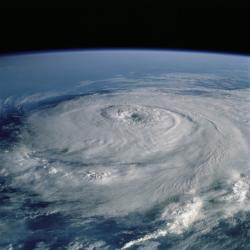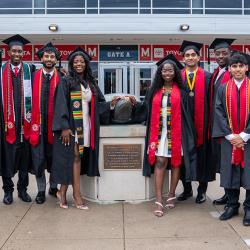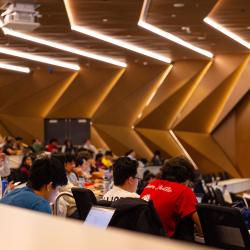Timothy Canty Reappointed as Director of University System of Maryland’s Marine Estuarine Environmental Sciences Graduate Program for Three-year Term
Canty has been leading the program since late 2019
Timothy Canty has been reappointed as director of the University System of Maryland’s interdisciplinary Marine Estuarine Environmental Sciences (MEES) Graduate Program for a second three-year term, effective July 1, 2022. Canty is an associate professor in the Department of Atmospheric and Oceanic Science (AOSC) at the University of Maryland, College Park (UMCP).
“Tim has proven that he can lead this complex organization, and I am confident he will spend the next three years strengthening all aspects of the program,” said Amitabh Varshney, dean of the College of Computer, Mathematical, and Natural Sciences at UMCP.
The MEES program is one of the largest environmental graduate programs in the University System of Maryland with more than 100 students. Headquartered on the UMCP campus, MEES is offered jointly with the University of Maryland, Baltimore; the University of Maryland, Baltimore County; the University of Maryland Eastern Shore; and the University of Maryland Center for Environmental Science (UMCES).
Founded in 1978, the MEES program confers master’s and doctoral degrees in the environmental sciences with a focus on one of four interdisciplinary foundational areas: environment and society; Earth and ocean sciences; ecological systems; and environmental molecular science and technology. The MEES program has conferred more than 1,000 graduate degrees over the past four decades.
When Canty began leading the program, he focused a lot of attention on improving administrative processes and increasing involvement of faculty members from all of the USM institutions. He led efforts to streamline the admissions process and develop new policies and guidelines that address confusion and resolve issues for students and faculty members related to MEES being a multi-institutional program.
“When I began serving as director in late 2019, I filled vacant administrative staff positions in early 2020 and then the pandemic hit,” Canty recalled. “I am so proud of the MEES staff for all of the hard work they put in to moving everything online and keeping the program operating, especially because none of us had a full understanding at the time of all of the existing policies and procedures.”
As director, Canty also supported the creation of a MEES Graduate Student Organization, which aims to build a stronger community amongst the students and enhance communication between students and the MEES leadership team.
“We've been able to compete with our top peer institutions to attract some of the best students in the country,” Canty said. “Since I’ve been director, we’ve had a McNair Scholar and two Flagship Fellows.”
Canty joined UMCP in 2007 as a research scientist. He helped to launch AOSC’s undergraduate program and has served as its director since 2013. He also oversees the mandatory research component of the AOSC undergraduate program and serves as director for the department’s Master of Professional Studies program. Canty also co-leads UMD’s executive education programs in climate finance and risk management.
Canty’s personal research focuses on stratospheric ozone, climate change, and air quality science and policy. He uses observations from satellites, balloons, aircraft and ground-based instruments, combined with various physical and chemical modeling platforms, to improve our understanding of Earth’s atmospheric composition. Since 2010, he has provided air quality modeling support and multiplatform data analysis to the Maryland Department of the Environment and other member states of the Ozone Transport Commission.
A co-author of more than 40 peer-reviewed research publications, Canty is a member of the American Geophysical Union and the American Meteorological Society. He earned his bachelor’s degree in physics from Hartwick College in New York and his master’s degree and Ph.D., both in physics, from the New Mexico Institute of Mining and Technology.
MEES’ 100 faculty members hail from the system institutions and UMCES laboratories including Horn Point Laboratory, Chesapeake Biological Laboratory, Appalachian Laboratory, and the Institute of Marine and Environmental Technology (IMET). Scientists from NASA, the National Oceanic and Atmospheric Administration, the Smithsonian Institution, the U.S. Geological Survey, and other federal research agencies also mentor students in the program.







